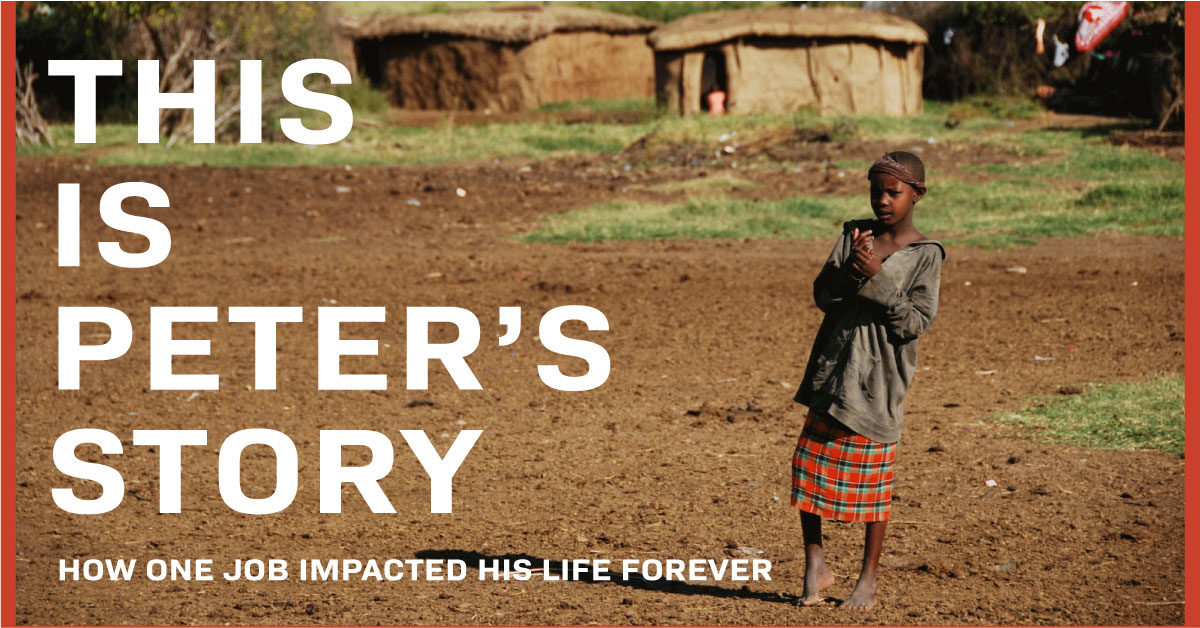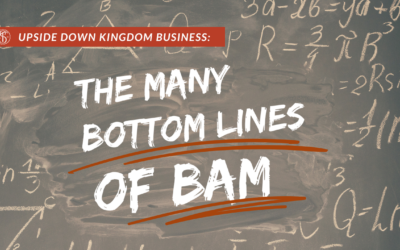Our friends at Sinapis are doing beautiful work raising up people by practicing principles of biblical entrepreneurship in poor countries around the world.
We are big believers in exercising business principles where biblical entrepreneurship is at the center. Business dealings are a vital part of God’s Kingdom work, both here at home and to the ends of the earth.
Sometimes it’s hard for people to see this through the lens of Western materialism, but here’s a story from East Africa that shows us a beautiful example of the redemptive role principles of biblical entrepreneurship can have in the marketplace. Profitable businesses dedicated to God are transforming lives all over the world. CEO of Sinapis, Mathew Rohrs, shares Peter’s heartwarming story that will show you just that:
One of our Sinapis program alumni in Nairobi, Kenya is a couple named Grace and Greg; they’re practicing these principles of biblical entrepreneurship to a tee. They went through our training program followed by our six-month accelerator. These principles of biblical entrepreneurship are taught through the accelerator, and they illuminate how businesses can be used as a tool for blessing people and changing communities.
When we asked them about the biggest impact the Sinapis training made in their life. By using principles of biblical entrepreneurship, they were able to share the following story of an employee named Peter:
Peter’s Story
Peter was about 22 years old when he joined their team. He moved to Nairobi from Western Kenya, having grown up in a rural village. His parents sent him to Nairobi with hopes that Peter would be able to find employment and life because there was essentially nothing for him in the village.
Stop and think about that as a parent. I’ve got three kids. What would it be like to send one of my children to another city with almost no resources and no connections, with no ability to help shelter and shape that experience, with only a prayer: “Lord, please provide for him and let him make a life.”
Peter arrives in Nairobi and he’s bouncing around from odd job to odd job. People are taking advantage of him and not paying him. That’s when he providentially connected with Grace and Greg. They run a startup company called Cakes.co.ke, the first bakery in Kenya to offer online ordering. Grace and Greg have IT backgrounds, but they also have a passion for running this small business using principles of biblical entrepreneurship.
After going through the Sinapis training, Grace and Greg initiated some unusual policies for an East African startup. Cakes.co.ke offers free breakfast and lunch for all their employees because many don’t have enough food at home. They also committed to paying their employees first, a normal business practice in the United States, but not necessarily a given in all parts of the world. Many business owners take their salary first and distribute whatever is leftover to their staff. By using principles of biblical entrepreneurship, Grace and Greg were going to be different.
The Opportunity
Peter initially hired on as a cleaner and as a delivery guy. He didn’t have a lot of education and this was a relatively low paying job, but it afforded him dignity. He was a hard worker and did a great job as a member of the team. He didn’t say much, kept his head down, and did faithful quality work. That got the attention of his leaders. One day, Grace walks into the bakery and Peter pulls her aside for a private conversation. This was totally out of the ordinary for Peter, but Grace gladly complied.
“Because of this job and because of the things you’ve done to provide for me,” he said, “I have some big news to share.”
It was big news indeed. In just nine months, Peter had saved enough money to build his parents back in the village a new home. This is a guy that was living near the poverty line, who found gainful employment with people, (people using kingdom principles of biblical entrepreneurship I might add..) who cared about him as a person, provided some really good voluntary fringe benefits, and his mindset was, “I’m going to pay this forward and build my parents a home that doesn’t leak.”
The Impact
Peter asked Grace and Greg if they would join him on a trip back to the village to see what they had done. They took the whole staff! The journey was a couple of hundred kilometers, but Greg’s encounter was worth all the effort. “I’ll never forget the look in his father’s eyes as he thanked us for the role that we played in leading a business with integrity, caring about their son, and helping him find a life.”
As a fun follow-up to this story, Peter is not a cleaner any longer. He got promoted to the bakery team. He has a career path in front of him, all because a profitable business using principles of biblical entrepreneurship created a job for him in East Africa.
This is just one simple story. It’s not a “blow your mind business” that changes everything. Cakes.co.ke has just 16 employees. But because it’s profitable, it’s led by people who love God. Those people are using principles of biblical entrepreneurship, and they’re making a huge difference in the lives of people.
BONUS: If you’re interested in hearing Peter’s Story directly from Grace and Greg and seeing Peter and his parents’ new house for yourself, click here.
More Principles of Biblical Entrepreneurship: Gut Business Instincts
The phone rang with some discouraging news. A project we’d been working on for months, that we thought was in the bag (at least in principle), was starting to look unexpectedly shaky. Even though as a company we are grounded in principles of biblical entrepreneurship, this still really caught me off guard.
I found my mind wandering during my other morning appointments, turning new approaches over and over in my head. What were we going to do? How were we going to get this project back online again?
What Now?
When I stepped out of my meeting, I took some time to clear my head. However, instead of principles of biblical entrepreneurship taking over, my gut instinct took over:
I called on a couple of trusted advisors.
We tried to discern the underlying motives, we strategized counter-arguments, we brainstormed ways to tilt the scales back in our favor. All good things. Normal business moves. But there was one key thing my gut reaction didn’t lead me to do:
Pray.
I never once stopped to inquire of the Lord.
Strangely enough, I’ve been reading through the Old Testament accounts of Israel’s leadership disasters in the book of Judges and 1 Samuel and journaling my thoughts on what I see there. Over and over again, God rescued His people. And over and over again, they forgot Him and leaned into their own understanding (Proverbs 3:5-6). Chaos ensued, they eventually repented, and the whole process began all over again.
Why were these people so stubborn? So stupid? (Evidently, they hadn’t learned from the principles of biblical entrepreneurship I’m talking about..)
Why am I so stubborn? So stupid?
The Problem
The problem is not in calling on trusted advisors (there is wisdom in wise, godly counsel). It’s not in strategizing, brainstorming, even fighting back! The problem is starting with human wisdom and not first stopping to inquire of the Lord.
What if our gut business instinct was to immediately turn to God in prayer? What if our hearts were so intent on abiding in Jesus that our involuntary response to conflict and stress was to find a quiet place to seek the Lord? What if our first reflex was to utilize these principles so biblical entrepreneurship can thrive, thereby inquiring of our Heavenly Father in the heat of the moment?
There is a time to use our God-given intellect, a time to pull together our team and discern the next best move, even a time to come out swinging (being a Christian doesn’t mean being a wimp). But what do we do first? Where does our gut instinct lead us? Where do our principles of biblical entrepreneurship take us? To save ourselves or to the Savior?
I want my gut business instinct to lead me first to Jesus. How about you?
#principles of biblical entrepreneurship







